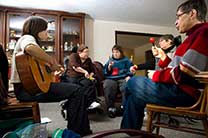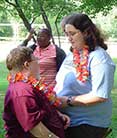Home » Glossary
- ABS
- Adaptive Behavior Scale – assessment of skills that a person uses in their daily living
- Adaptive Behavior
- The effectiveness of degree with which a person meets the standards of personal independence and social responsibility expected of his/her age and cultural group
- ABD
- Aged, Blind and Disabled population
- Advocate
- A person who represents a residents and acts on his or her behalf in order to protect his or her rights and interests.
- Abuser Registry
- The Abuser Registry lists individuals who have committed abuse, neglect, misappropriation of funds, a failure to report an incident, or who have engaged in improper sexual relations with an individual who has a developmental disability.
- Active Treatment
- A holistic plan designed by a team of specialists to teach a person to live more independently and the regular participation in this plan with the assistance of direct support and other professionals
- ADL
- Activities of Daily Living including hygiene, mobility, eating, toileting, etc.
- ADA
- The Americans with Disabilities Act, enacted in 1990, prohibits discrimination against persons because of their disabilities. The ADA serves as a “comprehensive national mandate for the elimination of discrimination against individuals with disabilities.” (42 U.S.C. 12101(b)(1)) The ADA targets three major areas: Title I addresses discrimination by employers; Title II addresses discrimination by governmental entities; and Title III addresses discrimination in public accommodations operated by private entities.
- Advocacy
- Activities in support of people with developmental disabilities including rights protection, legal and services assistance, and system or policy changes.
- APSI
- Advocacy and Protective Services Inc. is an agency that provides guardianship services to people with developmental disabilities, age 18 or older, who otherwise would not be able to advocate for themselves.
- Assistive Technology
- Assistive Technology (AT) can be a device that is used to increase, maintain, or improve the functional capabilities of a person with a disability or a service that directly assists a person with a disability in the selection, acquisition, or use of an assistive technology device. Examples of AT include augmentative communication devices which assist a person who cannot communicate through speech to communicate with others, and adaptive equipment which assists a person to write (such as an adapted pencil or arm brace), or move objects in the person’s environment (such as a switch or remote control device).
- Autism Spectrum Disorder (ASD)
- A group of diagnoses that describe characteristics consistent with autism.
Aversive Things or events which are unpleasant or painful. An aversive consequence is used to weaken or decrease a negative behavior. Aversive strategies can only be used under very specific circumstances and the procedure bust be monitored closely.
- Behavior Support Plan (BSP)
- Defines how services and supports are used to address behavior issues for a person.
- BSVI
- Bureau of Services for the Visually Impaired
- Buy-In Options
- This is federal Medicaid reform enacted by Congress that allows states to modify Medicaid elgibility rules that permit people with disabilities returning to work to secure extended Medicaid coverage, but also requires them to contribute toward such coverage, according to rules established by the State. See MBI-WD.
- BVR
- Bureau of Vocational Rehabilitation. A state agency which may provide funding for services, equipment, and supports that prepare an individual with disabilities for employment.
- CARF
- Council on Accreditation of Rehabilitiation Facilities performs a review regarding the quality of care in residential facilities. Successful surveys result in CARF Accreditation.
- CHIP/SCHIP
- Children’s Health Insurance Program/State Children’s Health Insurance Program (also known as Healthy Start)
- CMS
- Centers for Medicare and Medicaid Services is the federal agency that administers Medicare and Medicaid, and regulates the certification of agencies and care facilities for people with developmental disabilities.
- COEDI
- Children’s Ohio Eligibility Determination Instrument (and Ohio Eligibility Instrument, OEDI), are tests to determine the eligibility of persons for state and county developmental disabilities services.
- COG
- Councils of Government.
- County Board of Developmental Disabilities (CBDD)
- County Board of Developmental Disabilities. The powers and duties of this political subdivision are defined in ORC 5126.05. Ohio has 88 County Boards of DD — one in each county.
- CPT
- Cost Projection Tool used in Ohio to develop service plans for people who live together.
- DBU
- Daily Billing Unit is used when individuals share waiver services I a residential setting.
- Delegated Nursing
- The rules that govern the administration of medications and treatments by unlicensed staff in residential facilities and supported living. The rules mandate training and close supervision of staff by licensed nurses to prevent risks to health and safety.
- Developmental Center (DC)
- An Intermediate Care Facility (ICF) under the managing responsibility of the Department of Developmental Disabilities. Ohio has ten state-operated DC’s.
- Developmental Disabilities
- Developmental Disabilities refer to conditions that represent a significant delay in the process of child development. The delays may involve cognitive, physical, communicative, social/emotional, and adaptive areas of development. Without special intervention, these delays may affect the educational performance of the child.
- DSP
- Direct Support Professional is the staff person responsible for providing direct care and assistance to individuals receiving services in the DD services.
- DODD
- The Ohio Department of Developmental Disabilities — acronym used after October 5, 2009, following passage of Senate Bill 79,removing the words “Mental Retardation and” from the state agency’s name. (Replaces ODMRDD acronym)
- Dual Diagnosis
- Carrying a diagnosis of developmental disability and mental illness.
- Family Supported Services
- Locally-paid services, rather than waiver services.
- FICA Tax
- Federal Insurance Contributions Act is the tax withheld from an employees salary or self employment income that funds the Social Security and Medicare programs.
- Generalization
- Although a person is taught to respond in one specific situation, he or she may also show the response in other situations. Sometimes people who have intellectual disability will not be able to generalize a skill taught in one setting or situation to other situations.
- Group Home
- A home for persons with disabilities that generally has 16 or fewer residents.
- Guardian
- An individual who has legal control and management of the person, of medical matters only, or of the property or estate, or of both the person and property of a ward.
- Guardian of Person – a guardian appointed to assure that the ward receives proper care and protective supervision in keeping with his/her needs.
- Guardian of Estate – a guardian appointed to assure that the financial affairs of the ward are handled in his or her best interest.
- Habilitation
- Training in life skills, such as housekeeping, that have not been otherwise learned.
- HCBS Waiver
- A Home and Community Based Services Waiver allows a person to get services that are not normally covered under the state’s Medicaid plan.
- HIPAA
- Health Insurance Portability and Accountability Act of 1996. The HIPAA Privacy Rule creates national standards to protect individuals’ medical records and other Protected Health Information (PHI).
- Homemaker Personal Care
- Homemaker personal care is the in-home assistance with meal preparation, shopping, housekeeping, money management, personal hygiene and grooming, and laundry. This is a service provided under HCBS waivers.
- Home Modifications
- Home modifications are adaptations made to a home to allow for easier and safer access due to specific needs resulting from a disability.
- ICF/IDD (ICF)
- Intermediate Care Facility for the Mentally Retarded (federal language): A Medicaid-funded residential facility that teaches living skills to help people live in less restrictive environments. The acronym ICFMR, while still in statutory language, now may be represented as “ICF” with the remainder dropped.
- IDEA
- The Individuals with Disabilities Education Improvement Act (IDEIA) is a federal law that guarantees all eligible children with disabilities between the ages of 3 and 21 (or until the child graduates) the right to a free and appropriate public education designed to meet their individual needs. The Education for All Handicapped Children Act (Public Law 94-142) was an earlier version of the IDEIA.
- IEP
- Individual Education Plan. It outlines the goals and objectives necessary to meet the educational needs of a person. IHP or ISP or IP Individual Habilitation Plan. Individual Service Plan. Individual Plan. These outline what type of training or other supports may be needed to help people gain the living skills they need.
- Independent Living
- Independent living involves the belief that individuals with disabilities have the same rights and responsibilities as other people in society. Thus, services provided to the public should be accessible to persons with disabilities, and systems of support should be made available to help individuals with disabilities live within the community, and lead more independent lives.
- Interdisciplinary Team
- A group of people that is drawn from or represents those professions, disciplines, or service areas that are relevant to identifying an individual’s needs and designing a program to meet them, periodically reviewing the individual’s responses to the plan, and revising the plan accordingly. A complete team includes the individual being served, unless clearly unable to participate; the individual’s family, unless their participation has been determined to be inappropriate; those person who work most directly with the individual in each of the professions, disciplines, or services areas that provide services to the individual, including direct care staff; the legal guardian, if there is one; the SSA, and any other persons whose participation is relevant or requested by the individual.
- Informed Consent
- An individual’s (or his/her guardian’s) agreement to allow a procedure or treatment to happen after a full disclosure of facts needed to make the decision. The full disclosure of facts has to be communicated in a manner the individual can understand.
- IO Waiver
- The Individual Options Waiver is a home and community-based waiver to let people receive the services they need in their own homes.
- Intellectual Disability
- Intellectual disability is defined as, ‘significantly below-average general intellectual functioning (IQ 70-75 or below), existing concurrently with deficits in adaptive behavior.
- ISP
- Individual Service Plan. Developed to identify specific services and supports needed and desired by an individual. The ISP describes all services and supports necessary, regardless of payor source, for a particular individual to maintain health and safety, and avoid institutionalization. The ISP should explain how each support service is intended to meet a need, as indicated in the most recent assessment of the individual’s functioning levels.
- Least Restrictive Environment
- One of the principles of normalization. It requires that people with disabilities receive services and support in environments that do not limit their life activities unnecessarily. For example, children with disabilities should be educated in ways that meet their needs, and least limits their opportunities to be near and interact with other children.
- Letter of Intent
- A document prepared by the parents of a person with a disability which describes their wishes and intentions for their family member and provides information about the person that will help future care givers and advocates support him/her.
- Level 1 Waiver
- This waiver offers several different services with set spending limits. Some limits can be changed with prior approval from the local County Board of Developmental Disabilities.
- LOC
- Level of Care is a determination of the help needed to guarantee a person’s health and safety.
- Martin Settlement
- A legal agreement that allowed for a total of 1500 individuals with disabilities to receive Individual Options (IO) waiver services, enrolling during the years 2008 and 2009, and paid for through funds appropriated under the Martin v. Strickland Settlement of 2006.
- MBI-WD
- Medicaid Buy-In for Workers with Disabilities. (Also: MBI) A program to help people with disabilities who work maintain Medicaid coverage and not lose their benefits.
- Medicaid Card Services
- The Medicaid services that are available to people with and without a waiver.
- Medicaid Case Number
- This is a ten-digit, permanent identification number assigned by ODJFS to an individual’s file.
- MH
- Mental Health.
- MR/MH (see also MI/DD)
- Mental Retardation/ Mental Health: (See ‘mental retardation’, above — this acronym fading from usage as well) An MR/MH diagnosis may also be termed a ‘dual diagnosis’, wherein an individual exhibits both mental retardation and mental health issues. “MI/DD” is now preferred, and stands for Mental Illness/Developmental Disabilities”
- MUI
- Major Unusual Incident: The reporting system mandated by Ohio law that sets procedures to review and report allegations of abuse, neglect and other potentially serious incidents that occur in the Developmental Disabilities system.
- ODDP
- Ohio Developmental Disabilities Profile is an assessment tool for individuals enrolled on the Individual Options (IO) Home and Community Based Waiver.
- ODJFS
- Ohio Department of Job and Family Services, the single Medicaid agency for Ohio.
- ODDD
- Ohio Department of Developmental Disabilities: The name of the state department that oversees regulations and funding for services provided to people who have developmental disabilities.
- OEDI
- Ohio Eligibility Determination Instrument (diagnostic) for ages 16 and over. This refers to a test to determine the eligibility of persons for state and county Developmental Disabilities services.
- OJT
- On the Job Training
- Olmstead v. LC
- A U.S. Supreme Court decision that found that people with disabilities have rights to services in the least restrictive environment.
- Part C, Medicare
- Part of Medicare that allows for private insurance to contract with the federal government to offer Medicare benefits through their own policies.
- Part D, Medicare
- Section of the Medicare program that covers the cost of prescription medications.
- PASRR
- Pre-Admission Screening Resident Review. The system used to determine eligibility for nursing facility placement and/or specialized services.
- PASSPORT
- Pre-Admission Screening System Providing Options and Resources Today. A waiver available to people over the age of 60 who meet certain requirements.
- Patient Liability
- The amount that the consumer owes, per month, toward his/her care. This amount is determined by the Ohio Dept. of Human Services on an individual basis, and is related to a consumer’s income.
- People First Language
- The term used to describe the most appropriate way to refer to a person who has a disability. Rather than using terms such as “disabled person” it is more respectful to say “a person who has a disability.”
- Provider Pool
- A listing of DODD-certified waiver/supported living providers who have expressed an interest to a specific County Board of Developmental Disabilities, or responded to an RFP, to provide waiver/supported living services within the county. The provider pool is maintained by the County Board, and this listing is made available to persons receiving services and supports. These individuals may select a provider who is a member of the pool, or may select a certified provider who is not a member of the pool, but who is otherwise qualified to provide supports which the individual requires.
- QA
- Quality Assurance. A structured method of measuring and documenting quality of services.
- Redetermination
- A process of reassessment of an individual’s continued eligibility for waiver services. Redetermination activities begin for each individual enrolled on a waiver at least three months prior to the date ending his/her current waiver span. New assessments must confirm continued Medicaid eligibility, and are to be used as guidelines for writing a new ISP appropriate for the individual’s needs as described in the assessment report.
- Residence County
- County where a person lives — used in preparing certain forms.
- Respite Care
- A service designed to provide temporary residence for a person with a disability who ordinarily lives with family or friends, or to assume temporary responsibility for care of the person in his or her own home. This service provides back-up support, and in some cases relief, to people responsible for care of an ill or disabled person who ordinarily lives in their household.
- Self-Determination
- An initiative built on the principles of freedom, authority, support, responsibility, and confirmation. Self-Determination gives people with disabilities the freedom to decide how they will live, work and participate in the community; the authority to decide how the money allocated to them will be spent; the supports that will allow that person to lead the life they choose; the responsibility of assuring that the money they are using is spent in a useful and appropriate manner; and confirmation that the person and his or her family are critical to making life decisions and designing the system to help them.
- Service Coordination
- The management of a person’s set of services, typically by a government entity. See SSA, below.
- SL
- Supported Living. Defined as assistance directed toward individuals with disabilities, which enables them to live as independently as possible in their own communities, with supports as they choose.
- SSDI
- Social Security Disability Insurance. The plan pays monthly benefits to disabled workers and their dependents. The plan is funded by Social Security. Participants must have accrued sufficient quarter-years of employment and payment into the system to qualify for benefits.
- SSI
- Social Security Income. The federal government provides income support to people 65 and over, adults and children with blindness or other disabilities, who have few or no financial resources.
- State Plan
- A term used to describe the services available in Ohio through the Medicaid card.
- Supported Living
- Supported Living is a service model based on principles that emphasize a person’s choice, self-determination and community integration.
- TCM
- Targeted Case Management is the coordination of specialized services for an individual that helps them get the needed services, evaluates if the services are appropriate and monitors them. TCM is a Medicaid-reimbursed service.
- Transition Planning
- Transition Planning is a coordinated set of activities focused on improving the academic and functional achievement of a student with disabilities to promote the student’s movement from school to post-school activities. Post-school activities can include college, vocational training, employment, continuing and adult education, adult services, independent living, or community participation. Good transition planning is outcome-oriented, and focuses on results that help the student reach post-school goals. For students with disabilities, transition planning occurs during an Individualized Education Program (IEP) meeting.
- UIR
- Unusual Incident Report
- Waiting List
- Each County Board of Developmental Disabilities establishes a waiting list when there are not enough resources to meet the needs of everyone requesting services. If a person asks for a service that has a waiting list, a county will document the request, along with the date and time it was requested, and place the person’s name on the list if the service is desired within the next twelve months.
- Waiver
- Waiver is usually used in reference to the Home and Community-Based Waiver program where a state has applied for and received permission to use Medicaid funds to assist and keep people with disabilities in the community. Many of the restrictive requirements of using Medicaid monies are usually waived in these programs.
- Waiver Span
- A consecutive 365 days, during which an individual’s waiver is expected to be authorized. Ordinarily, the first day of an individual’s span would be the same date of the year in which that individual first received waiver funding. In a Leap Year, a waiver span is 366 days.














